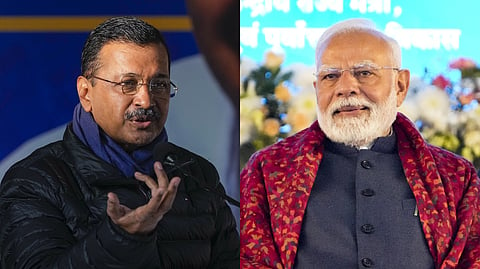

The Election Commission on Tuesday announced the dates for Delhi Assembly elections.
The elections are scheduled to happen in single phase on February 5. Votes will be counted and the results declared on February 8.
The election process will be completed before February 10, the Commission said.
The last date to submit nominations will be January 17 and the scrutiny of nominations will be done by January 18. Candidates will be able to withdraw their nominations till January 20.
With the announcement of the date of elections, Model Code of Conduct has come into force in the national capital.
The term of Delhi's 70-member Assembly ends on February 23. Delhi has traditionally seen assembly polls in a single phase.
"It is a single-phase election. We have deliberately kept polling on a Wednesday so more people come out to vote, like we did in Maharashtra," Chief Election Commissioner Rajiv Kumar said at a press conference.
Of the 70 seats in Delhi, 58 are general and 12 reserved.
According to the electoral roll, Delhi has 1. 55 crore voters -- 83. 49 lakh men, 71. 74 lakh women and 1,261 transgender persons.
There are 25. 89 lakh young voters, 2. 08 lakh first-time voters, and 830 above the age of 100.
More than 13,000 polling stations will be set up in Delhi, the CEC informed.
Bypolls to two assembly constituencies -- Milkipur in Uttar Pradesh and Erode in Tamil Nadu -- will also be held according to the same schedule.
In the 2020 polls, AAP won 62 seats and the BJP eight while the Congress drew a blank.
The ruling Aam Admi Party (AAP) headed by former chief minister Arvind Kejriwal is pushing for a third consecutive term in power while the BJP, which managed to make a mark in the Lok Sabha elections, is all set to nab the capital city.
The Congress is also another key player in the game. The grand old party is contesting alone in the upcoming elections, taking on both BJP and AAP, its alliance partner in the Lok Sabha polls.
Asserting that his party will form government in Delhi, AAP supremo Arvind Kejriwal on Tuesday said the Delhi Assembly polls will be a contest between the "politics of work and politics of abuse."
"This election will be between the politics of work and the politics of abuse. The people of Delhi will have faith in our politics of work. We will definitely win," Kejriwal said on X.
Kejriwal and AAP leaders have been accusing the BJP of hurling abuses and trying to win the elections without having any chief ministerial candidate and issues.
In an apparent blow to the BJP-led NDA government, the Election Commission informed that no Delhi-specific provision can be made in the Union Budget that can disturb the level-playing field.
Responding to a query about the the Union Budget, scheduled days ahead of the polls, Kumar said, "We will write to the cabinet secretary that no Delhi-specific provision can be made in the Union Budget that can disturb the level-playing field."
Urging political parties to maintain decorum during elections, CEC said that the commission would conduct checks to ensure free and fair polls.
"We will check everyone for ensuring money-free elections. During recent polls, there was a hue and cry that some helicopters were checked. People even come down to threatening polling officers but we control ourselves because it disturbs the level playing field," Kumar said.
"The star campaigners and those in political campaigns are duty-bound to ensure that etiquette is followed... We will be very harsh. Star campaigners should not act in a way that discourages common voters," he said.
District magistrates and returning officers will ensure fair play and a level playing field for every candidate, he added.
"We will also request the political parties not to create undue pressure on the officials," Kumar said and added that the parties could ask for any explanation in writing.
Kumar also cautioned the political parties not to cross certain lines while campaigning, stating that polarisation during poll campaigns can leave scars that may last forever.
"World over, if you look at democracies, words like 'democratic backsliding', 'democratic recession' are being used. Country after country, you can see what is happening," he said.
The campaign period is becoming so polarised in one country after another that the scars created during that time do not fade even during non-campaign periods, he added.
"Therefore, it is extremely necessary that campaigns are regulated, political parties also become sensitive and responsive, not cross lines which are being crossed the world over," Kumar said.